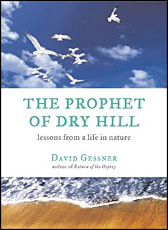" 'Conrad was so intent on exploring himself,' I said. 'But you chose to leave yourself behind.'
"John bristled a little. 'Oh, I was pretty involved with myself, too,' he said. 'I was reading Jung and deciding between him and Freud. It was really a question of learning about myself and nature simultaneously. On the one hand it was a process of moving away from myself, moving toward uncertainty and mystery. But on the other it was getting to know myself. If I hadn't had that interest in psychology, then I wouldn't have gone as deeply into nature as I did.'
" 'So going outside yourself was part of going in?
" 'Well, it's not that simple, of course. It's not just walking into the woods and saying, "Oh, here I am. I've found myself — isn't that nice?" It's rigorous work, leaving your own thoughts behind and focusing on following the footprints of a shrew or the diggings of a skunk. Certain preconceptions have to be left behind as well. It's a discipline, you see. The easiest thing is to let your thoughts boomerang back to yourself. But you need to keep the mind and eyes turned outward. That's when the transformation starts. But really it is that simple. The way to start is to get out there.
" 'And yes, sure, looking outward and looking inward are intertwined. As John Muir said of a walk he took, "By going outward I found I was going in." There is always an underground relationship between us and the world we live in. That's why those who ignore so-called nature — who make fun of it, as if it were some dowdy, old-fashioned preoccupation — do so at their own risk. They forget that we all began in nature and that our words and culture were formed out of our relation to the animal world. We concern ourselves with names and facts and figures, and of course money, money, money, but all the while we sometimes forget that our lives are a secret conversation with the green world. We are still animals and we still react to weather, fire, and our animal kin. But I don't think you can understand nature without looking into yourself. The native people knew that. Theirs was not introspection so much as a different sort of looking. And of course if you begin to spend more time in the natural world, you feel yourself starting to change. You find you are recreated.
" 'I realized that nature is essential to everyone. Many people forget this, but it doesn't mean it's any less true. People who ignore nature feel something nagging at them, something missing, like a lost limb, and they never understand that they need to get outside into the world. They think they can work out problems of salvation within themselves, but that is a hopeless quest. What we all need is something more than ourselves. And that is where nature comes in. The outside world affects the inside world. The great tragedy of the twentieth century is that we have denied nature and imagined ourselves above it.' He made a little dismissive wave toward the sand. 'We've said, "We're the big guys on the planet now. We're beyond nature. That stuff's not important to us." Humility is the missing ingredient, of course. People think of humility as some passive thing, but it's hard work. Being humble enough to leave yourself behind and enter into places. To leap out of yourself. And then to gradually start to care.'
"He turned away from me, toward the water. 'What is it that we're missing? I think we have an essential wilderness in us that is too often stifled. That wilderness builds up in us and becomes dark because we ignore it. When we go into nature, we are looking for a release, a dialogue.' He paused as if finished but then continued. 'We are searching for a match for that wilderness inside us in the wild land.' He gestured north, toward Provincetown. 'And in the wild sea, of course.' "
